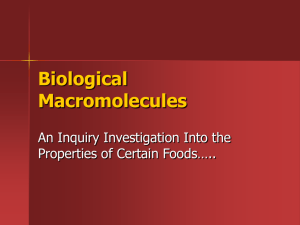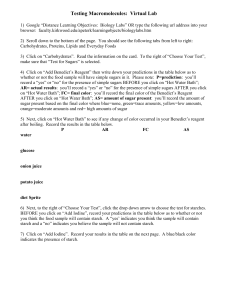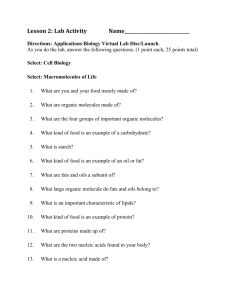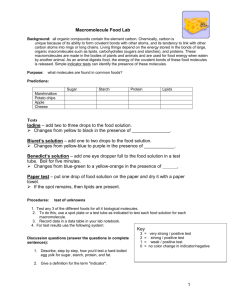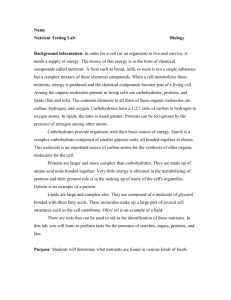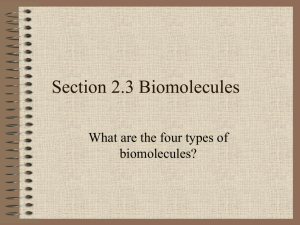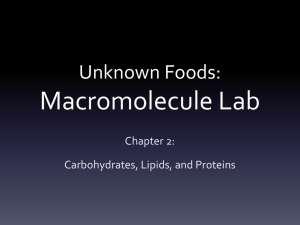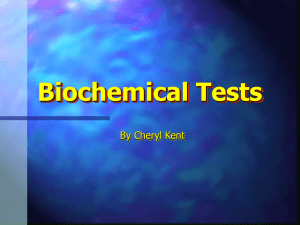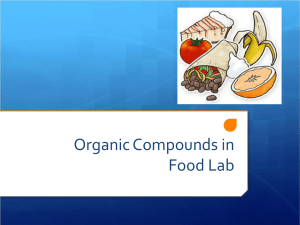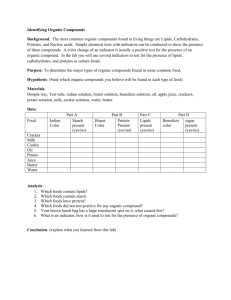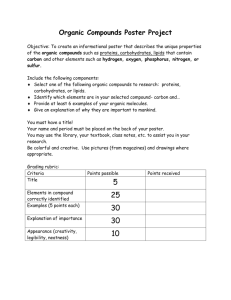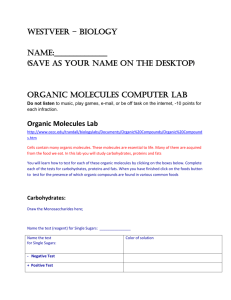Scientific Method and Organic Molecules LAB Name
advertisement
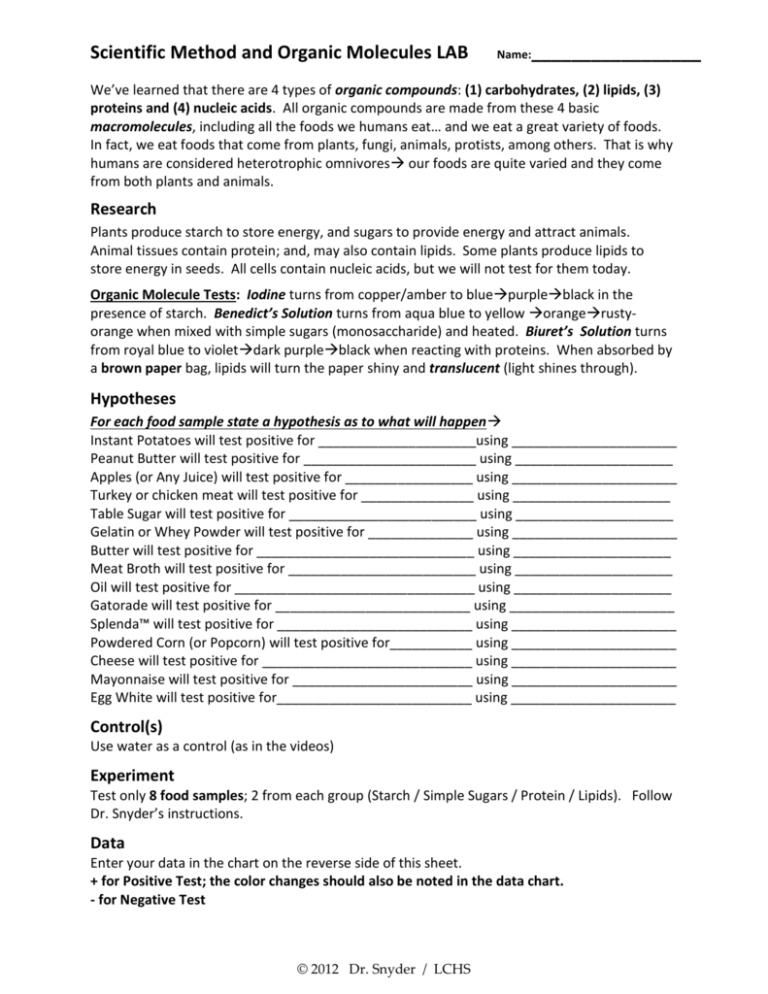
Scientific Method and Organic Molecules LAB Name: _________________ We’ve learned that there are 4 types of organic compounds: (1) carbohydrates, (2) lipids, (3) proteins and (4) nucleic acids. All organic compounds are made from these 4 basic macromolecules, including all the foods we humans eat… and we eat a great variety of foods. In fact, we eat foods that come from plants, fungi, animals, protists, among others. That is why humans are considered heterotrophic omnivores our foods are quite varied and they come from both plants and animals. Research Plants produce starch to store energy, and sugars to provide energy and attract animals. Animal tissues contain protein; and, may also contain lipids. Some plants produce lipids to store energy in seeds. All cells contain nucleic acids, but we will not test for them today. Organic Molecule Tests: Iodine turns from copper/amber to bluepurpleblack in the presence of starch. Benedict’s Solution turns from aqua blue to yellow orangerustyorange when mixed with simple sugars (monosaccharide) and heated. Biuret’s Solution turns from royal blue to violetdark purpleblack when reacting with proteins. When absorbed by a brown paper bag, lipids will turn the paper shiny and translucent (light shines through). Hypotheses For each food sample state a hypothesis as to what will happen Instant Potatoes will test positive for _____________________using ______________________ Peanut Butter will test positive for _______________________ using _____________________ Apples (or Any Juice) will test positive for _________________ using ______________________ Turkey or chicken meat will test positive for _______________ using _____________________ Table Sugar will test positive for _________________________ using _____________________ Gelatin or Whey Powder will test positive for ______________ using ______________________ Butter will test positive for _____________________________ using _____________________ Meat Broth will test positive for _________________________ using _____________________ Oil will test positive for ________________________________ using _____________________ Gatorade will test positive for __________________________ using ______________________ Splenda™ will test positive for __________________________ using ______________________ Powdered Corn (or Popcorn) will test positive for___________ using ______________________ Cheese will test positive for ____________________________ using ______________________ Mayonnaise will test positive for ________________________ using ______________________ Egg White will test positive for__________________________ using ______________________ Control(s) Use water as a control (as in the videos) Experiment Test only 8 food samples; 2 from each group (Starch / Simple Sugars / Protein / Lipids). Follow Dr. Snyder’s instructions. Data Enter your data in the chart on the reverse side of this sheet. + for Positive Test; the color changes should also be noted in the data chart. - for Negative Test © 2012 Dr. Snyder / LCHS EXPERIMENT: 1. Each table group collects 8 Food Samples; 2 from each group that we are testing for. 2. Put ALL the foods on a brown paper towel and label them (you only need a small pinch of each sample). 3. Test each food sample for the Organic Molecule you had predicted that it contained; remember… you completed this on side 1 of this lab sheet. 4. Place a Positive Symbol (+) on the chart below, IF it tested positive (e.g., color change) 5. If it tested negative, then place a Negative Symbol (-) on the chart, and choose another test for that sample. 6. Continue for each sample until you have a positive reaction for each. 7. Everyone needs to fill out this Lab/Activity Sheet and turn it in… even though you are working in groups. NOTES for SIMPLE SUGARS TEST with BENEDICTS SOLUTION A. Put a pinch of your food sample in a test tube B. Add ½ inch of water, put your thumb over the top of test tube and shake C. Add 5-8 drops of Benedict’s Solution and shake again D. Place it in the water bath for 5-10 minutes. E. Record the color change DATA TABLE Food Item Biuret’s Solution Iodine Benedict’s Solution Brown Paper Bag 1. 2. 3. 4. 5. 6. 7. 8. ANALYSIS Did your Hypotheses (predictions) you made on side 1 hold true? If NOT, then what new test did you perform and why did you choose it? What Chromatic Indicator changes did you spy during the 2 tests for simple sugars? Why are there different Chromatic Indicators for these tests? What do they tell you about the organic molecules in your food sample? What errors might have occurred? Would you do anything different if you reran the experiment? © 2012 Dr. Snyder / LCHS
